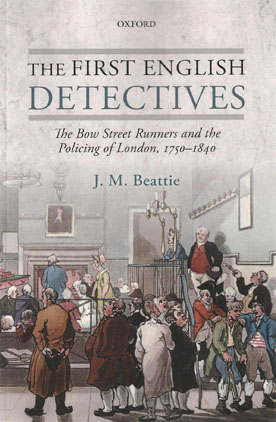
This is the first comprehensive study of the Bow Street Runners, a group of men established in the middle of the eighteenth century by Henry Fielding, with the financial support of the government, to confront violent offenders on the streets and highways around London.
They were developed over the following decades by his half-brother, John Fielding, into what became a well-known and stable group of officers who acquired skill and expertise in investigating crime, tracking and arresting offenders, and in presenting evidence at the Old Bailey, the main criminal court in London. They were, Beattie argues, detectives in all but name. Fielding also created a magistrates' court that was open to the public, at stated times every day.
A second, intimately-related theme in the book concerns attitudes and ideas about the policing of London more broadly, particularly from the 1780s, when the detective and prosecutorial work of the runners came to be challenged by arguments in favour of the prevention of crime by surveillance and other means.
The last three chapters of the book continue to follow the runners' work, but at the same time are concerned with discussions of the larger structure of policing in London - in parliament, in the Home Office, and in the press.
These discussions were to intensify after 1815, in the face of a sharp increase in criminal prosecutions. They led - in a far from straightforward way - to a fundamental reconstitution of the basis of policing in the capital by Robert Peel's Metropolitan Police Act of 1829. The runners were not immediately affected by the creation of the New Police, but indirectly it led to their disbandment a decade later.